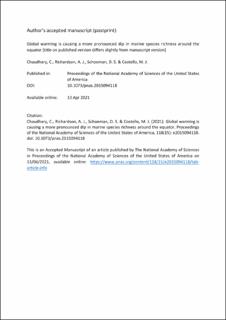Global warming is causing a more pronounced dip in marine species richness around the equator
Peer reviewed, Journal article
Accepted version
Permanent lenke
https://hdl.handle.net/11250/2771087Utgivelsesdato
2021Metadata
Vis full innførselSamlinger
Originalversjon
Chaudhary, C., Richardson, A. J., Schoeman, D. S. & Costello, M. J. (2021). Global warming is causing a more pronounced dip in marine species richness around the equator. Proceedings of the National Academy of Sciences of the United States of America, 118(15): e2015094118. doi: 10.1073/pnas.2015094118Sammendrag
The latitudinal gradient in species richness, with more species in the tropics and richness declining with latitude, is widely known and has been assumed to be stable over recent centuries. We analyzed data on 48,661 marine animal species since 1955, accounting for sampling variation, to assess whether the global latitudinal gradient in species richness is being impacted by climate change. We confirm recent studies that show a slight dip in species richness at the equator. Moreover, richness across latitudinal bands was sensitive to temperature, reaching a plateau or declining above a mean annual sea surface temperature of 20 °C for most taxa. In response, since the 1970s, species richness has declined at the equator relative to an increase at midlatitudes and has shifted north in the northern hemisphere, particularly among pelagic species. This pattern is consistent with the hypothesis that climate change is impacting the latitudinal gradient in marine biodiversity at a global scale. The intensification of the dip in species richness at the equator, especially for pelagic species, suggests that it is already too warm there for some species to survive.
